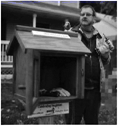Todd Bol, a retired businessman, could never have expected that a wooden container he built in his front yard one day would have the global impact it does today.

Bol built a dollhouse-size structure that looked like a schoolhouse on a post and he put it in his yard as a free community library to remember his mother, who was a book lover and school teacher. Bol's prototypegave birth to Little Free Library (LFL), a nonprofit organization that seeks to place small, accessible book exchange boxes in neighborhoods around the world. The concept is simple: Neighbors are invited to share a book, leave a book, or both. Today, there are over 50, 000 of these libraries registered in 70 countries.
Almost everyone can register with LFL and start a library as long as the person keeps it in good shape and makes sure that book materials are appropriate for his/her neighborhood. Library owners can create their own library boxes; therefore, the libraries are usually unique in appearance, and there seems to be no limit to the possibilities. One library in California was built out of a used wine container; another in Texas had tiny stairs and bright colored walls. Once registered, libraries are assigned a number at LFL's website. The LFL Index lists the locations of all libraries with GPS coordinates (坐标)and other information. Owners receive a sign saying "Little Free Library".
People say they have been attracted to pick up a book when walking by a Little Free Library, out of curiosity and because it's convenient. Some sidewalk librarians say they have met more neighbors since having a little library in their front yard. Bol is also most proud of the way Little Free Library is bringing communities together. "It's started a neighborhood exchange. It gets people talking and more comfortable with their neighbors," he says. "This leads to them helping each other."
